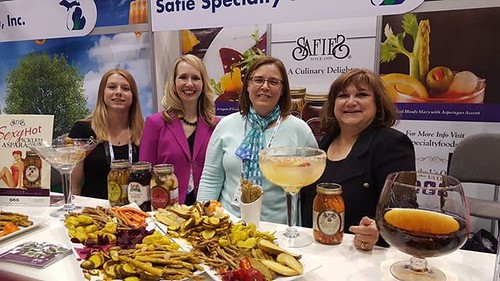
Every month, USDA shares the story of a woman in agriculture who is leading the industry and helping other women succeed along the way. This month, we hear from Mary Safie, owner of Safie Specialty Foods. In 1994, Mary took over her family’s canning business which began in 1929 in her grandfather’s kitchen with food grown on his farm in Chesterfield Township, Michigan. Specializing in pickled vegetables, Safie’s has experienced success domestically and abroad, with assistance from USDA’s Foreign Agricultural Service and State Regional Trade Groups.
Tell us how you reignited the family business in 1994 and how you assumed a leadership role?
It was the passion that I learned as a young girl, following my dad and relatives in the pickling process that reignited our family business. I wasn’t ready to let go of the process and with my Dad and Mom at my side, I decided to continue with the family tradition. We are now a successful, women-owned and operated business.
What does a typical day look like for you?
I’m an early riser and usually off to the plant to walk the floor and see factory staff for the morning. I make certain daily decisions that are passed on to the supervisory staff. Any mechanical interruptions or order explanations are taken care of and inventory reports are received. On a daily basis, I’m on the phones marketing and planning for future orders and product research. Currently, my focus has been on marketing and introducing our newest product, our Organic Sweet Pickled Beets, which have generated a tremendous amount of buzz and positive feedback.
Who are your role models?
My parents—George and Madeline Safie—laid the foundation and provided guidance and are the best role models I could have asked for. Our staff and advisors at Safie’s create a dynamic, collaborative team with regard to processing, marketing, and growing operations.
What do you wish you knew before starting into food?
How the globalization of our food supply is reliant upon a strong knowledge of food safety and quality assurance. There is a science behind a sustainable shelf life, lasting taste and presentation. Also, growing to understand the needs of regulatory agencies has been challenging, as they are very task-oriented until you understand the how and why. But the support and guidance that I have received and continuously receive will always be the backbone of the growth of knowledge of organization.
You’ve had success exporting your products. How did you find overseas markets? What benefit has this provided for your business?
We worked very closely with the USDA’s FAS program and other federal programs offered through the state of Michigan’s Department of Agriculture & Rural Development. Through MDARD, we were given a grant for equipment and expansion, which allowed us to grow and put us where we are today. These opportunities gave us the ability to attend trade shows internationally and domestically, where we secured the overseas markets we sell our products to. It all begins with a fantastic product that we market and produce, and support from USDA programs.
What is some advice you have for other women looking to run a successful business with both domestic and international markets?
First and foremost, you must possess a strong passion and a love of the work that you are doing, because it becomes a part of you. Drive and tenacity are two key ingredients to a recipe for success. Love what you do, do what you love, and you’ll always shine.
